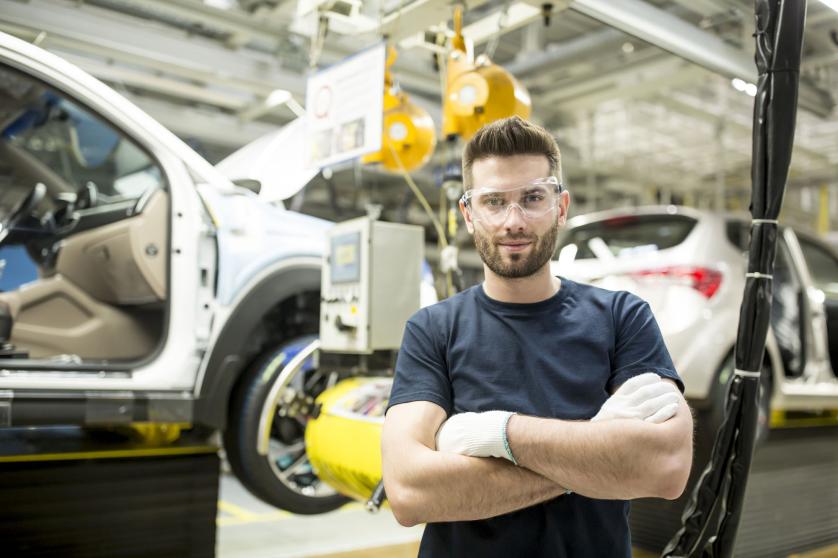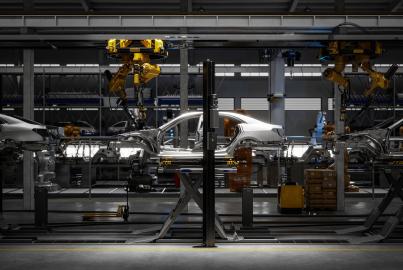EPP Group Position Paper: Securing the Competitiveness of the European Automotive Industry

As a key pillar of the economy, the automotive sector provides over 13.8 million quality jobs across the entire value chain and contributes 7% to the EU's GDP, generating wealth across all Member States. For more than 150 years, it has been a key driver of prosperity in the region.
The European automotive and supplier industry is facing unprecedented pressure from both external and internal challenges. There is a distortion of competition, especially from heavily subsidised Chinese manufacturers, alongside difficult location factors like high-energy costs and extensive regulatory requirements such as excessive reporting obligations. Additionally, the demand for cars in general - and electric vehicles in particular - has decreased rapidly. At the same time, the industry is adjusting to the EU climate and environmental targets - the highest worldwide - whilst managing the pressing need to transition towards digital technologies.
The EPP Group supports the proposal of the President of the Commission to open a Strategic Dialogue on the Future of the Automotive Sector, a process that will personally be led by the President herself, and in which participation will be required from automotive stakeholders, representatives from the European Parliament, the European Commission and the Council of the EU. The EPP Group demands that, as a result of this dialogue, a holistic EU strategy will be defined that helps the sector manage the various challenges and reviews the applicable EU regulatory framework. The EPP Group also sees the following immediate and long-term measures as key for preserving a globally competitive key industry that provides high-quality jobs and prosperity within Europe, all whilst achieving climate neutrality by 2050.
1. Ensuring that the Best Technologies Can Compete
The EU must re-establish technological neutrality as a core guiding principle, taking into account the realities of the sector. Recent policy decisions - such as the revised CO2 emissions performance standards for cars and vans (2019/631) and heavy-duty vehicles (2019/1242) - have compromised this principle by effectively banning the sale of new internal combustion engine vehicles. As technological neutrality embodies the principles of subsidiarity and proportionality, the ban is irreconcilable with EU law. Additionally, the current regulation focuses only on tailpipe emissions, overlooking the broader environmental impact of vehicle production, use, and disposal. This approach disproportionately favours electric vehicles and limits fair competition among different technologies. It is, therefore, essential to establish a level playing field that enables the best technologies to compete. All technologies that can contribute to achieving climate goals should be treated fairly, without favouring or biasing any particular technological solution. The EU's climate policy should prioritise market-based measures over blanket bans. This approach allows CO₂ reductions to be achieved at the lowest cost, while giving consumers choice and enabling engineers to compete in developing the best solutions. Consumers deserve access to the lowest-cost technologies and the best possible information to choose the mobility solution that fits their needs.
- Correcting the ICE Ban: The upcoming 2035 ban on internal combustion engines (ICEs) should be reversed in order to reflect technological neutrality, meaning to allow a mix of technologies while staying on track to achieve the Union's decarbonisation targets. Whilst electric vehicles (EVs) will play a major role in the transition towards a climate neutral future, other technologies can also help to achieve our climate targets. The European Commission must urgently present a revision to Regulation 2019/631 that reintroduces the technological neutral approach and acknowledges the role of all technologies in achieving CO2 reductions. The revision should recognise the role of alternative fuels, including e-fuels, biofuels, renewable or synthetic fuels, by providing explicit exemptions, accompanied by other measures such as introducing a carbon-correction factor, thus revising the ICE ban from 2035 onwards. Within this revision, the Commission should also propose a definition for carbon-neutral fuels, ensuring an appropriate reduction in emissions compared to conventional fuels, ultimately reaching climate neutrality by 2050. It should also acknowledge the role of other technologies, such as plug-in hybrids (PHEV), and ensure adequate enabling conditions across the EU, such as the availability and affordability of EVs, recharging and refuelling infrastructure and alternative fuels.
- Review: Given the long development processes in the automotive industry, the EU Commission must move the scheduled review for Regulation (EU) 2019/631 forward to 2025 in order to correct the ICE ban and provide the sector with legal certainty and planning security as soon as possible. While a combination of policies is needed, it is important to note that the positive climate impact of the ETS by 2030 is estimated to be 25-times-higher than those of Regulation 2019/631. This limited climate impact must be taken into account while weighing the targets against imminent job losses and deindustrialisation in Europe.
- Heavy-duty Vehicles and Trailer Targets: European emission reduction targets must be ambitious yet realistic for the industry to achieve. The recent revision of the Regulation on CO2 emissions performance standards for heavy-duty vehicles (Regulation (EU) 2019/1242) failed to achieve this balance. By the end of 2026, the Commission should review Regulation 2019/1242 and adjust the heavy-duty vehicles and trailer targets to ease burdens on mid-cap companies and adopt a technology-neutral approach by recognising the role of alternative fuels.
- Avoid Penalties: The sales market for electric cars is not developing as expected. Sales figures are lagging behind expectations, and manufacturers are at risk of failing to reach their 2025 emission reduction target, resulting in potential fines in the billions. In the current crisis, manufacturers need their revenues to master the transformation. The Commission should carry out an analysis of the current situation and the expected development in the 2025 review and then decide which measures are needed to maintain the competitiveness of original equipment manufacturers (OEMs). These temporary relief measures could include options such as allowing banking and accounting of parts of sales, assessing compliance based on a three-year average, or temporarily adjusting the calculation method for penalties to take into account cars produced and not only cars registered. All these measures should take into account the efforts and investments that companies have already taken and thus avoid legal challenges. If penalties are unavoidable, they need to be reinvested in the European automotive sector for specific purposes (e.g. for infrastructure deployment, incentive schemes, digitalisation) instead of the general EU budget. It is necessary to prioritise pooling alliances within the EU or with like-minded partners to ensure that OEMs can enhance their competitiveness without giving advantages to external players.
- Synergy Effects With Other Sectors and Market-based Measures: Achieving climate goals requires decarbonising not only new vehicles but also the existing fleet. By allowing a variety of technologies beyond 2035, we can increase the use of alternative fuels, which are also compatible with current vehicles while allowing space for future innovation. Sectors that depend entirely on alternative fuels for decarbonisation would also benefit from this expanded market. In the context of Union-wide climate targets for 2040, it is also vital to acknowledge the production and use of renewable liquid and gaseous transport fuels including, from non-biological and biological origins and recycled carbon fuels from non-sustainable industrial processes as carbon-neutral beyond 2040. This recognition would promote synergies between transportation and industrial decarbonisation, balancing the supply and demand of e-fuels, biofuels and carbon-neutral synthetic fuels, while also helping both sectors lower their carbon footprints.
- Life-Cycle Assessment (LCA): It is of utmost importance that the EU finally develops a comprehensive LCA methodology by December 2025 to evaluate the environmental impact of vehicles from production to disposal and introduce it into the EU legislation. The Commission, having had the task of coming up with an LCA methodology since 2019, should introduce the LCA in Regulation 2019/631 and in Regulation (EU) 2019/1242 as soon as possible, finally respecting the will of the EU legislator.
2. Accelerating Infrastructure Roll-Out
The suitability for everyday use and social acceptance of EVs depends largely on price affordability, the development of the electricity grid, the provision and functionality of the charging infrastructure, as well as the installation of charging points in buildings. The lack of adequate charging and refuelling infrastructure is a significant obstacle to the widespread adoption of EVs and other sustainable technologies. Whilst the installation of infrastructure for light-duty vehicles is lagging behind, the infrastructure for heavy-duty vehicles is practically non-existent. The EU and its Member States must act decisively to build the required infrastructure. We need a comprehensive infrastructure offensive that safeguards an equitable distribution between Member States and regions.
- Infrastructure Investment: Simplified permitting processes and financial incentives should drive the roll-out of publicly accessible charging stations and refuelling points as well as the installation of charging points in buildings. The lengthy grid connection and permitting processes in Europe significantly delay the roll-out of charging infrastructure. The European Commission and Member States should do their utmost to improve permitting procedures, scale up electricity production, increase grid capacity, provide additional funding sources, and consider introducing mandatory deadlines for approvals, as seen in the Critical Raw Materials Acts (CRMA) and the Net Zero Industry Act (NZIA).
- Infrastructure Deployment: The Alternative Fuels Infrastructure Regulation (AFIR) has set concrete targets for the deployment of refuelling and recharging infrastructure. Member States must ensure a coherent and consistent implementation to unlock the full potential of the Single Market. However, it is also clear that more ambition is needed. Member States and the Commission should work together to ensure that additional infrastructure is deployed, e.g. through public-private partnerships, especially in less developed regions. The review of AFIR should go hand in hand with the review of Regulation 2019/631 and lead to more ambitious targets, in particular for heavy-duty-vehicles infrastructure. The Member States should also improve shared charging infrastructure for electric vehicles in buildings.
3. Supply Chain Resilience and Rules-Based International Trade
The automotive industry operates in a highly competitive international environment. Europe needs to ensure a level playing field between domestic and foreign producers. Where unfair practices such as dumping or unfair subsidies occur, the EU must take countervailing measures. At the same time, the EU automotive industry is highly dependent on critical raw materials (CRM) for battery production, which are largely sourced from a small number of countries. The EU must diversify and secure its supply chains to ensure sustainable production in the long term.
- Trade Agreements and International Cooperation: In order to diversify the supply chains, reduce dependencies and open new markets for the EU economy, the EU should finalise ongoing negotiations on trade agreements, initiate new negotiations and other forms of international cooperation with countries or regions such as ASEAN, and strengthen existing relationships with other third countries.
- Circular Economy Requirements: Efficient circular economy business models can play a significant role to help reduce reliance on imported raw materials, contributing to the sustainability of EV battery production within Europe. Regulation 2023/0284 on circularity requirements for vehicle design and on the management of end-of-life vehicles needs to strengthen circular business models by setting up a framework that facilitates and supports the EU automotive sector to develop itself as a leader in sustainable automotive innovation and strengthen the sector's competitiveness while reducing strategic dependencies.
- Raw Materials: A clear strategy for implementing the Critical Raw Materials Act as well as an ambitious action plan for CRMs that goes beyond those laid out in the CRMA is indispensable to support the CRM value chain, including the establishment of new production capacities and ensure the long-term sustainability of the sector. Within the EU, there are significant opportunities for extracting Critical Raw Materials essential for battery production and electrification. Additionally, the European Commission should collaborate with the automotive and mining industry to explore potential joint ventures for sourcing, extracting, and processing these materials, ensuring a predictable and sustainable supply chain for critical raw materials. As part of its Strategic Partnership agenda, the EU should financially support European companies' key projects in third countries to enable European companies to secure and diversify their supply of critical minerals, and ensure that critical minerals from Strategic Partner countries are directed to Europe. The EU should also foster the exchange of best practices, such as JOGMEC in Japan.
- Countering Unfair Practices: The European Commission has appropriately imposed anti-subsidy duties on the imports of battery electric vehicles originating from China. However, negotiations should continue to find a solution to the dispute as anti-subsidy duties are a measure of last resort. The Commission should also closely monitor any circumvention attempts and make full use of the instruments under the foreign direct subsidy regulation. In the event such practices are identified, it will swiftly activate the available trade defence instruments, including anti-subsidy and anti-dumping measures, while ensuring the continuation of diplomatic dialogue to resolve disputes.
- Reciprocity: The EU should address global structural trade imbalances with China and other economies by applying multilateral trade rules, enhancing EU trade tools, pro-actively supporting the reform of the WTO and firmly upholding the principle of reciprocity.
4. Promoting Innovation and Research & Development
Europe must strengthen its global leadership in automotive innovation by investing in forward-looking technologies like autonomous driving, Artificial Intelligence and alternative fuels. Enhancing R&D capabilities will position the EU to compete effectively in the global market. Additionally, increased funding is essential to support the transformation of the automotive sector and the regions impacted.
- Increased R&D Funding: The EU should raise direct funding for automotive R&D, prioritising AI, autonomous driving and alternative fuels. Partnerships between the public and private sectors should be promoted in order to accelerate innovation and facilitate deployment. The EU should take appropriate measures to prevent illegal technology transfers and protect the intellectual property rights of European companies.
- Aid for Regions Affected: The EU's Industrial Action Plan for the automotive sector should propose financial support measures (e.g. the Extension of the Just Transition Fund beyond 2027) to aid regions affected by the sector's transformation. Furthermore, targeted financial support schemes should not focus exclusively on the construction of new production facilities, but also on the transformation of existing facilities. Therefore, the European Commission should conduct a review of state aid guidelines to allow targeted funding schemes that address the industrial transition needs of companies, including suppliers, more effectively while maintaining fair competition among Member States.
- Reskilling & Upskilling: To strengthen the skills and capabilities of the current and future workforce, effective upskilling and reskilling programs must be implemented, addressing labour market demands, workforce shortages, and an ageing population. The closure of factories, relocation to third countries and job losses in Europe underscore the risks facing the automotive sector when competitiveness is overlooked.
- Foster EU Production: Carbon leakage in the automotive sector poses a significant threat. Importing electric vehicles from external markets like China, where emissions standards may differ, risks transferring emissions rather than achieving real global reductions. To genuinely ensure emission reductions, it is essential that EVs and key components are produced within Europe, preserving jobs, economic value, innovation and high environmental standards. Financial aid should prioritise vehicles manufactured in the EU, reinforcing local production and ensuring resilience against external dependencies.
- Important Projects of Common European Interest (IPCEI): IPCEIs are crucial in attracting investment to critical digital and green automotive technologies in Europe. However, reforming the IPCEI framework is necessary to enhance the efficiency, effectiveness, and predictability of the application process without disrupting the EU internal market.
- Data Access: The European Commission should introduce sector-specific regulations on access to in-vehicle data, supplementing the Data Act. This regulation should facilitate better access to in-vehicle data while ensuring the highest standard of cybersecurity and data protection. The Commission should also review and streamline the existing legislative framework to minimise administrative burdens by reducing overlaps. The European Commission should also actively promote the expansion of secure cross-border data transfers. Better access to globally connected and secure data is crucial, especially for advancing research and development in autonomous driving and vehicle safety.
- Steer Demand: To boost the sales of sustainable vehicles, Member States should introduce innovative support schemes such as purchase incentives, VAT reductions, or subsidised leasing. To aid this, the EU Commission should foster the exchange of best practices and publish guidelines to ensure that European producers truly benefit. To support potential national projects, the EU should consider advancing revenues from ETS 2 (Social Climate Fund and national income) with the help of the European Investment Bank. Additionally, the Commission should ensure that national ETS-2 revenues are used effectively and support households in transitioning to clean mobility.
5. Simplifying the Regulatory Framework
The complexity of the current regulatory framework and the excessive reporting obligations are some of the biggest barriers to innovation and growth within Europe. Concrete action is needed.
- Stress Test of the EU Acquis: The EU should conduct a comprehensive review of all existing legislation, including secondary legislation, affecting the automotive sector. A simplified, harmonised and streamlined regulatory environment and reporting obligations will reduce compliance costs and make it easier for companies to focus on innovation. The application of the "One-in-Two-out"-rule should be a guiding principle for future legislation. The Commission should also examine how digital one-stop solutions can simplify and facilitate compliance with reporting obligations and how they can be implemented.
- Simplification of Secondary Legislation: To create a more streamlined and transparent regulatory environment, the EU should introduce a simplification process for secondary legislation. This could include actions such as grouping related regulatory requirements into batches and systematically phasing out outdated regulations within a 5-year timeframe.
- Mandatory Competitiveness Checks: Any new legislative and policy proposal, including secondary legislation, must undergo an extensive Competitiveness Check before its publication, examining its potential impacts on the competitiveness of Europe and European companies globally. The Commission should commit to present legislative and policy proposals only if they have no negative effect on competitiveness and have explicitly received a positive opinion from the Regulatory Scrutiny Board.
Conclusion

EPP Group Position Paper on the European Automotive Sector
1 available translation
EnglishOther related content

6 / 54




